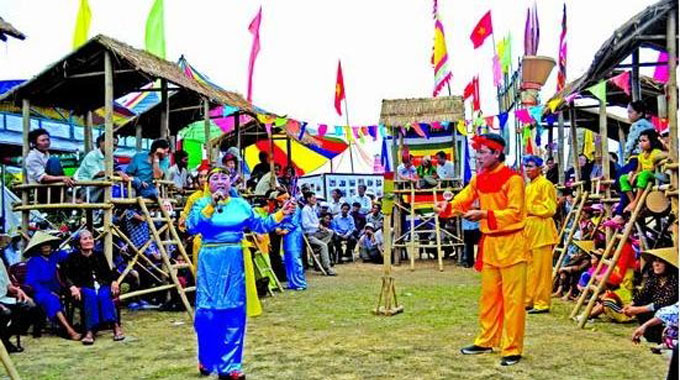‘Bai Choi’ singing (a popular folklore style of singing in the central and south central regions of Viet Nam), has been added to the UNESCO Representative List of the Intangible Cultural Heritage of Humanity.

A performance of 'Bai Choi' singing
The decision was announced on November 7 during the 12th session of the UNESCO Intergovernmental Committee for the Safeguarding of the Intangible Cultural Heritage, which is being held in Jeju, the Republic of Korea.
‘Bai Choi’ singing was one of 34 nominations considered by the committee for inscription on the Representative List of the Intangible Cultural Heritage of Humanity during the working session.
The dossier of Bai Choi singing met all of the necessary criteria and was highly appreciated by all of the 24 Committee members.
The UNESCO Council acknowledged Bai Choi singing as an important communal cultural activity, meeting the entertainment and arts demands of the community. Stories featured in the art form convey ethic lessons about patriotism, solidarity in the communities, and the experiences of ancestors.
The submitted dossier of Bai Choi also detailed the efforts made both in the past and at present to preserve the art form of the community, groups, and art clubs under the support of Vietnamese Government.
UNESCO’s recognition of Bai Choi reaffirmed the diversity of culture in Viet Nam’s ethnic groups.
Bai Choi singing is popular in Quang Binh, Quang Tri, Thua Thien-Hue, Quang Nam, Binh Dinh, Phu Yen, Khanh Hoa and Da Nang.
Bai Choi is often seen at local spring festivals and resembles a game, using playing cards and village huts. The Bai Choi songs are about festivals, daily life and work and are accompanied by musical instruments.
Bai Choi singing became the tenth Vietnamese cultural practice to be awarded UNESCO’s intangible heritage status, together with the Mother Goddesses belief of three realms, Vi Dam singing, Don Ca Tai Tu music, the worship of Hung Kings, the Giong festival, love duet singing in Bac Ninh province, Hue's royal court music, Gong space culture in the Central Highlands, and folk tugging rituals and games.
Previously, the cultural practice was honoured by Viet Nam’s Ministry of Culture, Sports and Tourism as a National Intangible Cultural Heritage in November 2014.